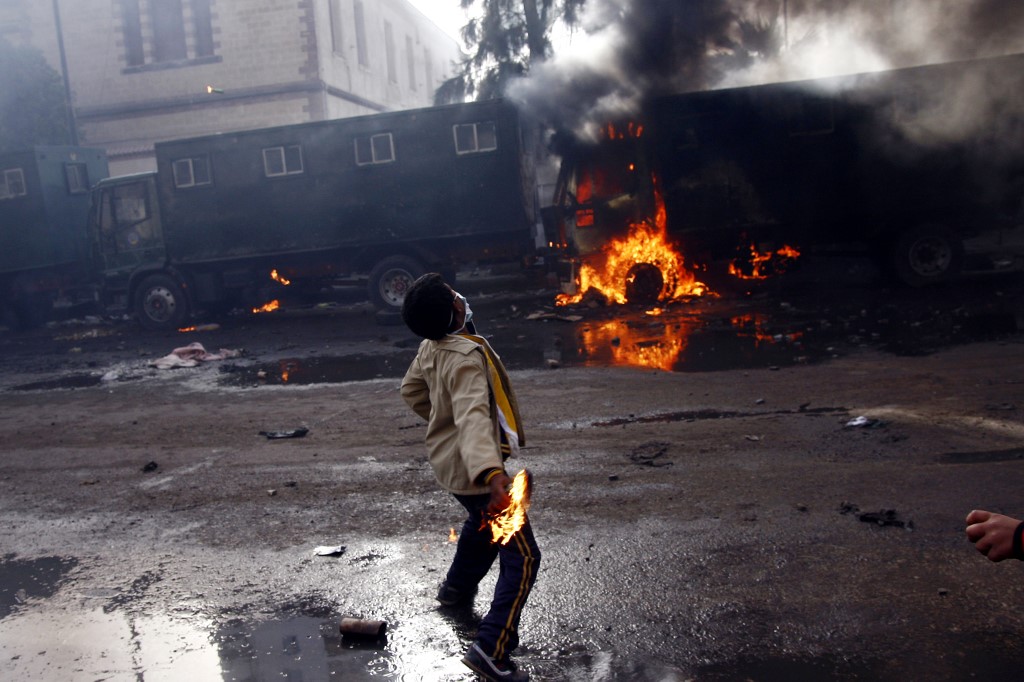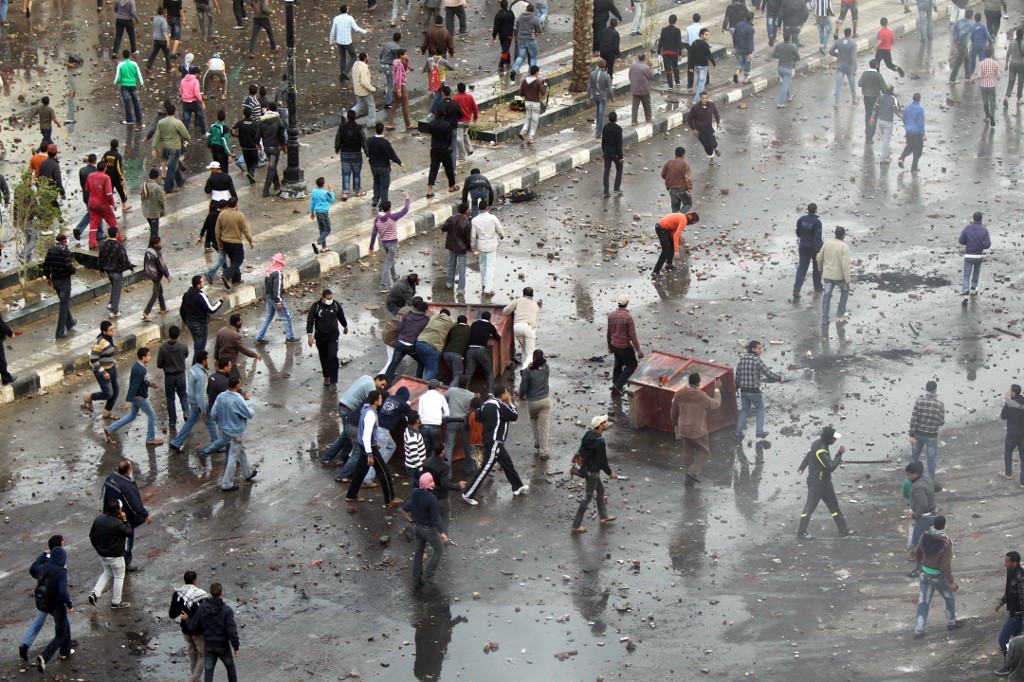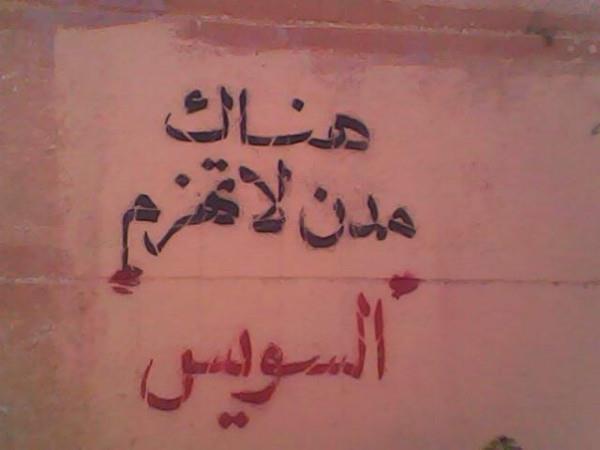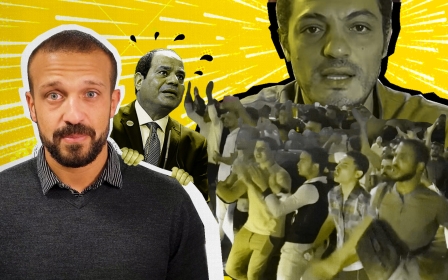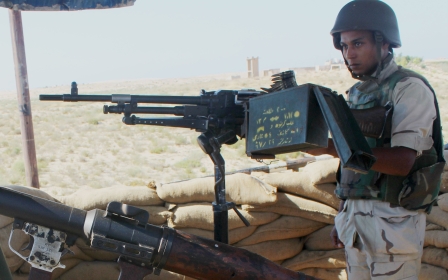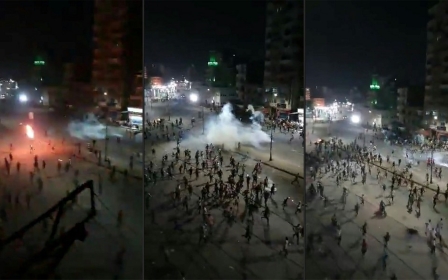The city that can't be defeated: Suez rises once again for anti-Sisi protests
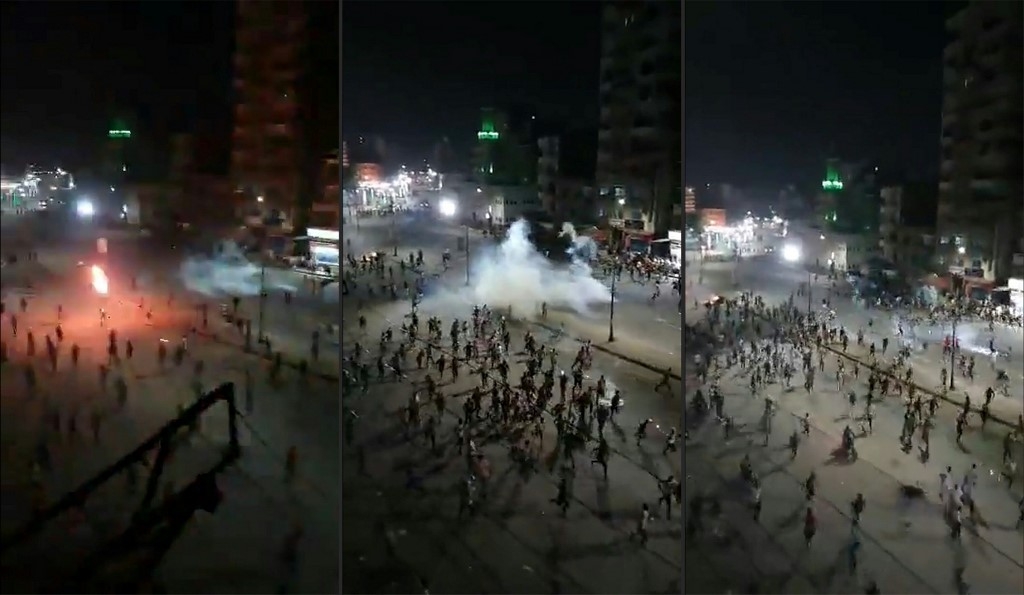
For decades, Egyptians in this port city have called home the ‘Republic of Suez’, a proud nod to their history of militancy against any oppressive force, starting with the Arab-Israeli war.
“Suez stood against the Zionists in 1973, otherwise all the people in Cairo and Alexandria would be talking Hebrew,” said Amin, 28, owner of a Suez internet cafe.
'The city has also stood against Hosni Mubarak and will be, God willing, the reason for Sisi’s fall'
- Saeid, technician
In the 2011 revolution, the first protester killed in Egypt was 21-year-old Mostafa Ragab, a fact that is worn with pride locally, while also fuelling antagonism against the police.
After his father died, Ragab had quit school to work at the Suez Cement Factory to support four sisters. He was shot multiple times on the night of 25 January when he was protesting.
Three days later, the police killed 17 people in one day, and the community went wild, eventually forcing officers to drop their weapons and give up.
New MEE newsletter: Jerusalem Dispatch
Sign up to get the latest insights and analysis on Israel-Palestine, alongside Turkey Unpacked and other MEE newsletters
“Suez declared its independence on 28 January 2011, when policemen took off their official clothes and stole civilian clothes to wear them, to avoid being chased by people,” Abu al-Soud said.
Sitting outside the internet cafe, with snacks from a nearby sandwich cart, Amin’s friend, Saied, a 30-something technician, said he believed the city would rise again.
“The city has also stood against Hosni Mubarak and will be, God willing, the reason for Sisi’s fall,” he said.
Spontaneity and shock
This past Friday, Suez stood out once again as one of the cities across the country where hundreds of Egyptians took to the streets in rare protests calling for Egyptian President Abdel Fattah el-Sisi’s departure.
Both Amin and Saied, who said they were eager for a day they could express their opinions freely and voice the needs of the city to officials without reprimand, were among those in the streets in a rally that they said was “very spontaneous and shocking”.
The protests began after the Egyptian Super Cup match between Ahly and Zamalek. “Only around 30 people protested at first,” Amin said.
“Then hundreds of people who don’t even care about politics, like street vendors or families, joined.”
Most of the protests took place in the iconic al-Arbaeen Square in central Suez. Security forces armed with armoured vehicles, riot gear, tear gas and live ammunition, tried to suppress the protests but in vain, eyewitnesses told MEE.
“We started to gain more and more ground, until they had to flee to the side streets. We threw their tear gas canisters at them. They seemed shocked,” said Kareem, a 25-year-old student at Suez University.
“Some riot armed personnel carriers were lost, and they were welcomed by Suezy women,” he said sarcastically.
'We have been silent for years, and every day the oppression increases. On Friday, this anger exploded'
- Ismail, doctor
As the APCs passed through the narrow streets, women and children threw rocks and dirty water at them, Kareem said. A short video tweeted that night appears to confirm his account, although MEE could not independently verify it.
“I have never seen women so verbal and angry in my life,” Kareem said. “People are devastated. To find stable work is now hard, and to settle and have a family is almost impossible.”
Ismail, a 32-year-old doctor, said tension has been building for a long time.
"We have been silent for years, and every day the oppression increases. On Friday, this anger exploded,” he said.
Police forces arrested three of his relatives, two of whom were out buying school supplies for their children to prepare for a new semester starting on Sunday.
“They have been referred to the state security prosecution, and they only possess pencils, papers, and lunch boxes,” he said.
Oppressive, random methods of law enforcement like this will only have one outcome, said Ismail: To turn the most apolitical citizens into angry dissidents.
Rebellious past
Residents in Suez have a history of rebelling for causes they believe in.
During the Mubarak era, there were regular labour protests and strikes organised among local factory workers. And after the city’s strong showing in 2011, young protesters stood against the 2013 military coup during which Sisi seized power.
For three years, a mix of liberal, Muslim Brotherhood and Salafi protesters held weekly protests against the president, the army and the police until a nationwide crackdown on demonstrations in 2016 finally reached Suez.
Several locals spoke of an unbreakable solidarity in Suez in the face of law enforcement officials.
“When the police kills, detains, or tortures one man or woman, it is not just one family who is in a vendetta with the police. It is the whole street or even the whole neighbourhood,” Samia, a political activist who used to organise for the 6 April movement in Suez, told MEE by phone.
This sentiment was clear in 2011, said Mohamed Abdel Kareem, a 67-year-old former employee at the Ministry of Endowments. “The majority of police cars and facilities in the governorate were burnt in hours,” he said.
Suez, he argued, never took enough credit for its role in the 1973 war, and has long been marginalised, lacking services and suffering worsening living conditions compared to other parts of the country.
The working class nature of the city with a population of around 740,000, plus its war history, has fostered this sense of community among its citizens.
As one of the entrances to the resistive Sinai Peninsula, the city was a stronghold of guerrilla fighters and popular resistance in October 1973 as locals defied Israeli units. Every year on the 24th of October, the governorate of Suez marks the Battle of Suez against the Israeli army as a day of popular resistance.
This solidarity of Suez is easy to see when residents are under pressure, as doctors shield wounded protesters from state security officers, or households open their doors to shelter strangers escaping from police forces.
Even when businessmen and MPs have tried to mobilise workers and shop owners to rally and chant for Sisi, it has backfired.
Essam, a worker at a Ceramica Cleopatra factory, said that he and his colleagues were gathered last Saturday and ordered to chant for Sisi.
“But the workers gathered and chanted 'leave' and ‘down with the military rule’,” he told MEE. A video posted on Facebook appears to confirm his account, but MEE could not independently verify it.
“We couldn't betray our people in Suez and chant for this criminal while there are people who are still arrested.”
'No mercy'
Since the protests began last Friday, Suez has transformed into a military fortress with hundreds of soldiers and officers surrounding the city, its security facilities, and government buildings.
MEE travelled to Suez from Cairo, and witnessed heavy concentrations of soldiers. At the entrance to the city and on each main street, there were armoured vehicles with machineguns on top, an APC and a police truck used to transport detainees.
'If you bring a squad, we will bring an army'
- Moataz, taxi driver
There were also checkpoints throughout the city, with officials pulling over microbuses and taxis to conduct random, but thorough searches of identity cards and mobile phones. Buses carrying tourists and private cars were allowed to pass through.
MEE witnessed four arrests in Suez. Two arrests involved plain clothed police officers who had been checking the social media accounts and mobile photo galleries of two young men. The duo were later handcuffed and taken into a police vehicle.
The other two were arrested in a night raid as masked men in cars stormed an educational centre in central Suez and kidnapped two people, whose whereabouts are still unknown.
“Suez youth are stubborn and do not stay silent when their rights are violated. It is an unwritten law that we have to pick a side,” said Moataz, a 29-year-old taxi driver.
“Even though they are trained to disperse protests, these are our streets and we know them very well and we will not falter against their attacks. If you bring a squad, we will bring an army. But the only difference is that we call for people to have enough money, food and to have their dignity.”
Last Friday, Moataz said a big crowd of protesters headed to a local police station after they heard that two girls had been arrested. “In no time, they were released,” he said.
Moataz remembers that people were chanting: “There are dogs of Sisi… there are dogs of Sisi.”
On a side streets leading to al-Arbaeen Square, an old stencil, most probably from the waves of graffiti that made its way onto Egypt’s streets during the 2011 uprising, reads: “There are cities that cannot be defeated: Suez.”
At a nearby cafe, Haythim, a 27-year-old employee at a private company, was on a break from work, smoking shisha and drinking a cold lemonade. “Haven’t you heard what Mohamed Ali said?,” he asked.
In one of the recent videos, the 43-year-old Egyptian whistleblower warned the police and Sisi “the people of Suez will mess you up”.
“Police officers,” Ali said. “I am telling you. In the next uprising, there will be no mercy.”
This article is available in French on Middle East Eye French edition.
Middle East Eye delivers independent and unrivalled coverage and analysis of the Middle East, North Africa and beyond. To learn more about republishing this content and the associated fees, please fill out this form. More about MEE can be found here.


